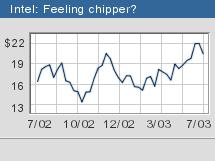NEW YORK (CNN/Money) -
If only America's businesses were as willing to spend as its consumers, the economy would be fine and dandy. Alas, this has not been the case.
Three years after going on a buying binge that would put Carrie Bradshaw to shame, U.S. companies have been remarkably unwilling to part ways with their cash. Worried over the possibility that the economy will run back into recession, they're determined to buy only the bare necessities. The result has been a contraction in business spending in all but one of the past 10 quarters.
In other words, it hasn't been a kind business environment for Intel (INTC: Research, Estimates). The big chipmaker, whose microprocessors lie at the heart of most personal computers, has seen its sales steadily erode since the beginning of 2001. Intel desperately needs U.S. companies to start laying out cash on tech equipment again.
The good news, for both Intel and the economy, is that it appears that this may have begun to happen.

In a June survey of Chief Information Officers at 311 companies, CIO Magazine found 14.5 percent of respondents said they had recently replaced a significant number of personal computers, while another 32.9 percent said they were in the midst of a significant replacement cycle now. The percentage of respondents who said tech spending prospects look "bright" over the next three months lifted to 18 percent from 11.6 percent in April.
"I don't think we're going to see Intel grow as fast as it did in the 1990s, because we're talking about a more mature industry," said Ed Hemmelgarn, head of the Cleveland-based hedge fund Shaker Investments. "But I do expect it to start growing again."
So do Wall Street analysts, who reckon the company saw sales jump by 5.6 percent in the just-finished second quarter from the second quarter of 2002. It would be just the second time since 2000 that the chipmaker has posted sales growth. Since Intel hasn't issued any kind of warning, it seems likely that it will at least meet these expectations.
Yes, but ...
The question, however, is whether the growth can continue. Yes, there does appear to be renewed demand for PCs from corporate America, but a fair amount of it is probably related to companies finally getting around to replacing all the equipment that they put in place ahead of the year 2000, when worries about Y2K disruptions prompted a bulge in tech buying. Once companies finally get around to replacing the four-year-old machine that's been sitting on Mrs. Johansson's desk, what's going to prompt them to buy more?
First, there needs to be a further acceleration in corporate profits, which pretty much are the main determinant in how much companies spend.
Second, the employment picture needs to improve. If Mrs. Johansson loses her job, there's no point in buying her a new PC. If you hire her an assistant, on the other hand, that's one more desktop you're going to need.
Bulls hope that Intel's brightened prospects augur well for the entire economy. First, companies will spend money on established technology equipment, like PCs, which have a track record boosting productivity, then they'll move on to investments with lower returns, like buying new lathes, or repaving the parking lot, and finally they'll move on to blue-sky investments, like emerging technology solutions.
|
 |  | Year* |  | Earnings growth |  | Revenue growth |  | 2001 | -68% | -21% |  | 2002 | -2% | 1% |  | 2003 | 22% | 5% |
|  |  |
| *2003 projected | | Source: First Call |
|
Unfortunately, points out Merrill Lynch chief North American economist David Rosenberg, there is scant evidence that this is about to happen. Yes, companies do appear to be boosting their spending on tech, but outside of tech, orders for new equipment have been dropping. That's a sign that companies are cutting into spending on other areas to boost their spending on tech.
Even increased profit growth might not be enough to turn the tide. Many companies are still straining under the excesses sown during the boom years, and much of the non-tech equipment they bought back then isn't likely to become obsolete as quickly as tech equipment does.
"You need more than just the ability to spend, you need the incentive to spend," said Rosenberg. "You're only going to start spending if you can prove to your board that your investment is going to pay off."

|

